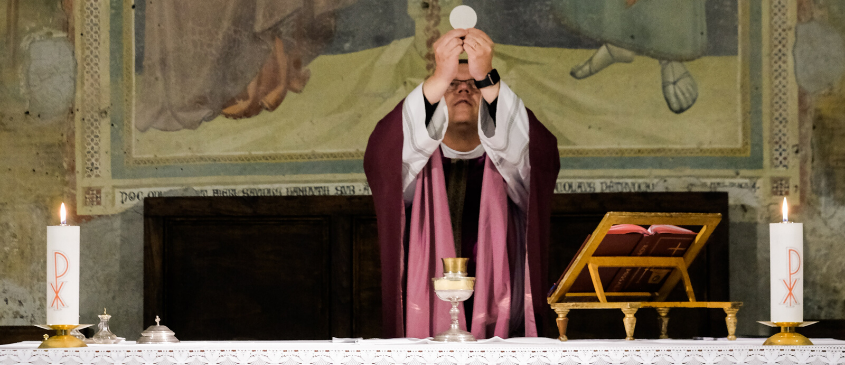by Joseph Cardinal Ratzinger:
Do we not often take the reception of the Blessed Sacrament too lightly? Might not this kind of spiritual fasting be of service, or even necessary, to deepen and renew our relationship to the Body of Christ?
The ancient Church had a highly expressive practice of this kind. Since apostolic times, no doubt, the fast from the Eucharist on Good Friday was a part of the Church’s spirituality of communion.
This renunciation of communion on one of the most sacred days of the Church’s year was a particularly profound way of sharing in the Lord’s Passion; it was the Bride’s mourning for the lost Bridegroom (cf. Mk 2:20)
Today too, I think, fasting from the Eucharist, really taken seriously and entered into, could be most meaningful on carefully considered occasions, such as days of penance—and why not reintroduce the practice on Good Friday? It would be particularly appropriate at Masses where there is a vast congregation, making it impossible to provide for a dignified distribution of the sacrament; in such cases the renunciation of the sacrament could in fact express more reverence and love than a reception which does not do justice to the immense significance of what is taking place.
A fasting of this kind—and of course it would have to be open to the Church’s guidance and not arbitrary—could lead to a deepening of personal relationship with the Lord in the sacrament.
It could also be an act of solidarity with all those who yearn for the sacrament but cannot receive it. It seems to me that the problem of the divorced and remarried, as well as that of intercommunion (e.g., in mixed marriages), would be far less acute against the background of voluntary spiritual fasting, which would visibly express the fact that we all need that ‘healing of love’ which the Lord performed in the ultimate loneliness of the Cross.
Naturally, I am not suggesting a return to a kind of Jansenism: fasting presupposes normal eating, both in spiritual and biological life. But from time to time we do need a medicine to stop us from falling into mere routine which lacks all spiritual dimension.
Sometimes we need hunger, physical and spiritual hunger, if we are to come fresh to the Lord’s gifts and understand the suffering of our hungering brothers. Both spiritual and physical hunger can be a vehicle of love.



